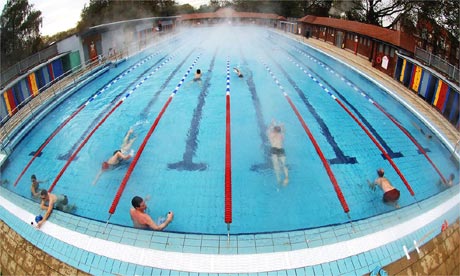
Free entry to swimming pools and leisure centres, better access to health advice and more "traffic light" health labelling of food are the best ways to improve public health, a survey of more than 2,000 people has found.
The results suggest people recognise the danger posed by rising obesity levels and are prepared to take their share of responsibility by taking more exercise and adjusting their diet.
They also show significant support for encouraging children to walk to school by banning cars near schools, and also suggest limiting levels of salt in food by law, increasing the tax on cigarettes, ensuring GPs give their patients annual medicals and insisting all schools have their own nurse.
However, the UK-wide poll, conducted for the magazine of the left-leaning Fabian Society, also reveals strong opposition to a ban on cigarette sales to anyone without a £10 smoking permit, a "fat tax" on snacks or "unhealthy" fast food, adding flouride to drinking water or the frequent weighing of children at school.
In recent years, the government has repeatedly tried to encourage health authorities to request water companies to flouridate supplies - at present, flouridation is concentrated in Birmingham, the west Midlands and the north-east and affects around 5.5 million people.
Calls for a "fat tax" are increasing, while the smoking permit idea was floated by Julian Le Grand, an academic at the London School of Economics and the chairman of Health England, a ministerial advisory board.
The Fabian Review commissioned the YouGov poll to test opinion on a dozen suggestions for public health, asking people to choose up to four that they most favoured and a similar number that they were most against.
Free access to pools and leisure centres was by far the most popular measure, but could initially leave a large hole in council budgets because charging recoups around 45% of the cost of such facilities in England.
The idea attracted 49% of those polled, and Blackburn with Darwen council, in north-west England, will give a clue whether this measure will work when it is phasing in free entry for all those who live or work within its boundaries from July.
The move will cost £6m over three years, but is regarded as a vital part of improving life expectancy in the borough, where people die, on average, eight years earlier than those living elsewhere in the country.
Implementing similar schemes nationwide would be very costly, and Chris White, the Local Government Association spokesman for sport, said: "We are hugely committed to anything that increases participation in sport and in physical activity generally.
"But the idea of offering free swimming for all poses important questions which need to be debated thoroughly, such as how much it costs and how it will be paid for."
He said there was "also a difference between setting aside enough to pay for something like this and actually making sure the money gets to the right place".
Making expert healthcare more easily accessible with guidance and support came second, gaining 43% of the vote – as result likely to encourage ministers seeking longer opening of GP surgeries, so-called polyclinics, and more high street alternatives.
But parts of the food industry may be disappointed by the 35% support for red, yellow, green traffic light labelling of food, promoted by the government's Food Standards Agency, because they fear the move could be too simplistic.
Salt levels are being reduced under voluntary programmes, but one-third of consumers think this could be made to go further by turning to legal requirements.
The £10 smoking permit tops the list of measures respondents believed the government should not introduce, with half of those polled against it. The fat tax on foods is nearly as unpopular, while nearly one-third were against more flouridation of the water supply.
"Sometimes we look at those nations we feel are naturally fit and more outdoorsy, such as Australia, and think how we can be more like them," Rachael Jolley, the Fabian Society's head of communication, said.
"How can we tear ourselves away from our TV sets on a wet Friday night to go to the gym? Of course, in a nation where the sun doesn't shine consistently in the summer it is not so easy to commit to an outdoor lifestyle, but our poll shows people do value the chance to do exercise such as swimming."
The Fabian Review, published tomorrow, concentrates on public health ahead of the 60th anniversary of the NHS.

